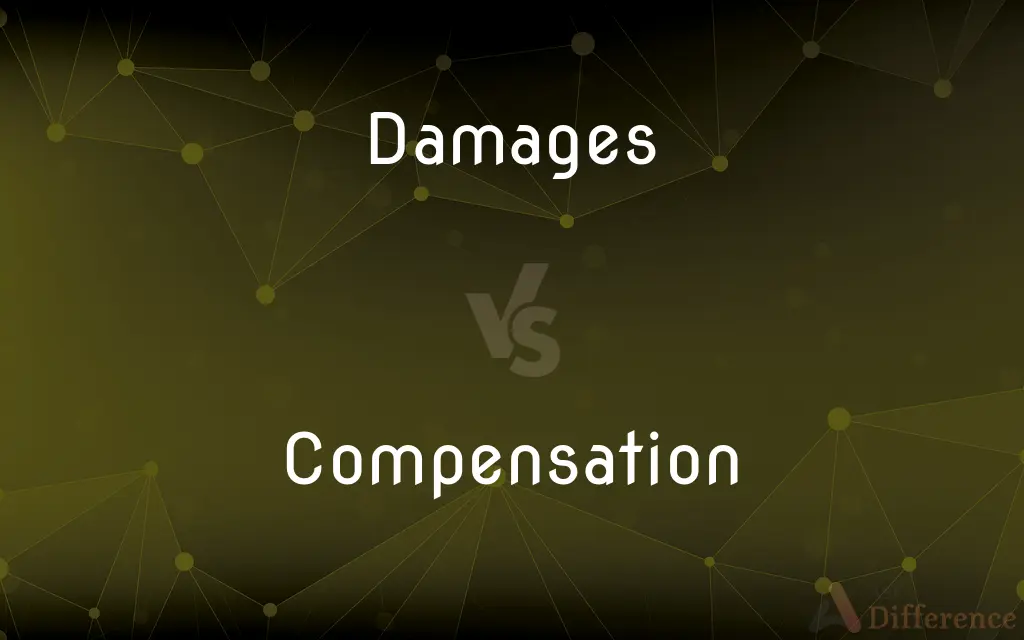Damages vs. Compensation — What's the Difference?
By Tayyaba Rehman & Maham Liaqat — Updated on April 14, 2024
Damages are monetary awards ordered by a court to a plaintiff for loss or injury, while compensation is a broader term that includes any payment for services or reimbursement for loss.

Difference Between Damages and Compensation
Table of Contents
ADVERTISEMENT
Key Differences
Damages are typically awarded in legal settings, often as the result of a lawsuit where the plaintiff proves harm caused by the defendant. Compensation, on the other hand, can refer to payments made for a variety of reasons, not necessarily as a result of legal action.
While damages are intended to make the injured party 'whole' again after a loss, effectively restoring them to their prior condition, compensation can be used more broadly for payments like salaries, reimbursements, or other financial settlements. Compensation does not necessarily relate to harm or injury.
Damages are often categorized into compensatory, punitive, or nominal, depending on the nature of the legal case and the intention behind the monetary award. Compensation, however, includes any form of payment made to someone for the purpose of offsetting costs, providing a benefit, or fulfilling a contract.
The determination of damages is usually a matter for courts and involves strict legal criteria and procedures. Compensation could be negotiated outside of court settings, such as in business transactions or employment arrangements, and does not always follow a contentious issue.
In terms of enforcement, damages awarded by a court are legally binding and failure to pay can result in further legal action. Compensation agreements, such as those in employment contracts, are also legally enforceable but are typically predefined and agreed upon by all parties involved.
ADVERTISEMENT
Understanding the difference between damages and compensation is crucial in legal contexts, particularly in cases of litigation and contractual agreements. Both serve to balance out losses, but their contexts and implications can vary significantly.
Comparison Chart
Definition
Monetary awards for loss or injury determined by a court
Payments made for services or to cover losses
Context
Legal settings, often involving litigation
Broad, including employment, contracts, insurance
Types
Compensatory, punitive, nominal
Salaries, benefits, reimbursements
Purpose
To restore the injured party to their prior condition
To pay for services or offset costs
Legal Binding
Determined by courts, legally enforceable
Often agreed upon by parties, legally enforceable
Compare with Definitions
Damages
Monetary compensation ordered by a court for harm or injury.
The court awarded $50,000 in damages to the plaintiff for medical expenses and lost wages.
Compensation
Agreed upon by parties, such as in employment.
She negotiated her compensation to include flexible working hours.
Damages
Legal enforcement follows a judgment.
Failure to pay the awarded damages can result in further legal consequences.
Compensation
Includes structured settlements, insurance payouts.
The insurance compensation for the flood damage helped rebuild her home.
Damages
Categories include compensatory, punitive, and nominal.
Punitive damages were awarded to deter the defendant from future misconduct.
Compensation
Payments made for services or to reimburse losses.
His compensation package at the company included a bonus, stock options, and health benefits.
Damages
Financial restitution as a result of legal action.
She received damages after proving the other party breached their contract.
Compensation
Broad application across various contexts.
Workers receive compensation for their time and labor.
Damages
Awarded to restore or compensate for a loss.
Compensatory damages covered the costs to repair his car after the accident.
Compensation
Often part of contractual or policy agreements.
Compensation for travel expenses was included in his employment agreement.
Damages
At common law, damages are a remedy in the form of a monetary award to be paid to a claimant as compensation for loss or injury. To warrant the award, the claimant must show that a breach of duty has caused foreseeable loss.
Compensation
The act of compensating or the state of being compensated.
Damages
Destruction or a loss in value, usefulness, or ability resulting from an action or event.
Compensation
Something, such as money, given or received as payment or reparation, as for a service or loss.
Damages
Damages(Law) Money required to be paid as compensation for an injury or wrong.
Compensation
(Biology) The increase in size or activity of one part of an organism or organ that makes up for the loss or dysfunction of another.
Damages
(Informal) Cost; price
What's the damage for the tickets to the show?.
Compensation
(Psychology) The act of consciously or unconsciously changing one's behavior to offset a real or imagined deficiency, as in personality or physical ability.
Damages
To cause damage to.
Compensation
The act or principle of compensating.
Damages
To suffer or be susceptible to damage.
Compensation
Something which is regarded as an equivalent; something which compensates for loss.
Damages
(legal) The money paid or awarded to a claimant (in England), a pursuer (in Scotland) or a plaintiff (in the US) in a civil action as compensation for a loss suffered by the same.
Compensation
(finance) The extinction of debts of which two persons are reciprocally debtors by the credits of which they are reciprocally creditors; the payment of a debt by a credit of equal amount.
Damages
A sum of money paid in compensation for an injury or wrong.
Compensation
A recompense or reward for service.
Damages
A sum of money paid in compensation for loss or injury
Compensation
(real estate) An equivalent stipulated for in contracts for the sale of real estate, in which it is customary to provide that errors in description, etc., shall not avoid, but shall be the subject of compensation.
Compensation
The relationship between air temperature outside a building and a calculated target temperature for provision of air or water to contained rooms or spaces for the purpose of efficient heating. In building control systems, the compensation curve is defined to a compensator for this purpose.
Compensation
(neuroscience) The ability of one part of the brain to overfunction in order to take over the function of a damaged part (e.g. following a stroke).
Compensation
The act or principle of compensating.
Compensation
That which constitutes, or is regarded as, an equivalent; that which makes good the lack or variation of something else; that which compensates for loss or privation; amends; remuneration; recompense.
The parliament which dissolved the monastic foundations . . . vouchsafed not a word toward securing the slightest compensation to the dispossessed owners.
No pecuniary compensation can possibly reward them.
Compensation
The extinction of debts of which two persons are reciprocally debtors by the credits of which they are reciprocally creditors; the payment of a debt by a credit of equal amount; a set-off.
Compensation
Something (such as money) given or received as payment or reparation (as for a service or loss or injury)
Compensation
(psychiatry) a defense mechanism that conceals your undesirable shortcomings by exaggerating desirable behaviors
Compensation
The act of compensating for service or loss or injury
Common Curiosities
Can damages be part of compensation?
Yes, damages can be considered a form of compensation but specifically in the context of legal restitution for harm or loss.
How are compensation amounts determined in employment?
In employment, compensation amounts are typically determined through negotiations between the employer and employee and include salary, benefits, and other perks.
How are damages calculated?
Damages are calculated based on the extent of the loss or injury suffered, including direct costs, loss of earnings, and sometimes emotional distress.
Who determines the amount of damages?
The amount of damages is usually determined by a judge or jury in a court of law based on evidence presented during a trial.
How does compensation differ from damages?
Compensation is a broader term that includes any payment or reimbursement for services, losses, or expenses, and is not limited to legal judgments.
What are punitive damages?
Punitive damages are intended to punish the defendant for particularly harmful behavior and to deter similar actions in the future.
What is the primary purpose of damages in a legal context?
The primary purpose of damages is to financially compensate someone for a loss or injury they have suffered due to another's actions.
Is compensation always monetary?
While often monetary, compensation can also include other forms of benefit like housing, cars, or medical insurance.
What is nominal damages?
Nominal damages are a small monetary amount awarded when a legal wrong has occurred but there is no substantial loss or injury to compensate.
What legal actions can follow the non-payment of damages?
Non-payment of damages can lead to additional legal actions such as garnishment of wages, liens against property, or other enforcement measures.
What is the difference between compensatory damages and actual damages?
Compensatory damages and actual damages generally refer to the same concept, both aiming to compensate the plaintiff for direct losses suffered due to the defendant's action.
Why might someone receive compensation outside of a legal setting?
Individuals might receive compensation outside of a legal setting for reasons like fulfilling contractual obligations, insurance claims, or corporate policies.
How does insurance relate to compensation?
Insurance is a form of compensation that provides financial reimbursement to the insured for specific losses as outlined in an insurance policy.
Can compensation be non-financial?
Yes, compensation can be non-financial, such as providing services, goods, or other benefits in lieu of money.
What factors influence the level of compensation in a contract?
Factors influencing compensation in a contract include the nature of the job, industry standards, individual qualifications, and market conditions.
Share Your Discovery

Previous Comparison
Protandry vs. Protogyny
Next Comparison
Oxocine vs. OxonineAuthor Spotlight
Written by
Tayyaba RehmanTayyaba Rehman is a distinguished writer, currently serving as a primary contributor to askdifference.com. As a researcher in semantics and etymology, Tayyaba's passion for the complexity of languages and their distinctions has found a perfect home on the platform. Tayyaba delves into the intricacies of language, distinguishing between commonly confused words and phrases, thereby providing clarity for readers worldwide.
Co-written by
Maham Liaqat













































